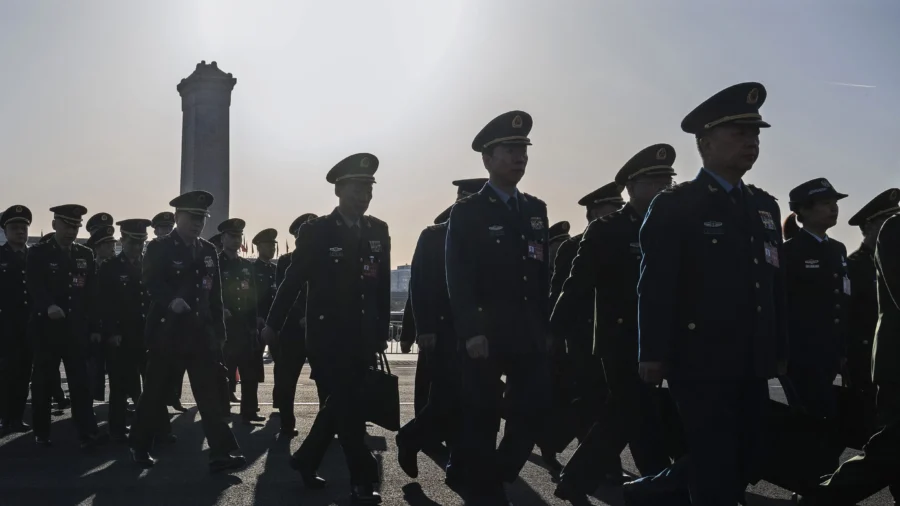An ongoing purge of top defense personnel by the Chinese Communist Party (CCP) has ensnared two more high ranking military commanders.
The two top commanders were removed from their positions at the National People’s Congress on Dec. 25, according to a statement from the standing committee of the CCP.
You Haitao, 66, was once a deputy commander of the People’s Liberation Army (PLA) ground forces. Li Pengcheng, 61, served as navy commander of the Southern Theater Command, which oversees operations in the South China Sea. Beijing asserts sovereignty over almost all of the dispute waterway.
Both You and Li were suspected of “serious violations of discipline and law,” the NPC statement read, using the CCP’s code words for corruption. No further details of the allegations were provided.
The regime’s defense ministry has remained tight-lipped about the firings.
At a monthly press conference in Beijing on Dec. 26, ministry spokesman Zhang Xiaogang didn’t respond to a question about the dismissal of the two military officials, simply saying that he had no information to release, according to Taiwan’s state-owned Central News Agency. The official transcript of the press conference, however, didn’t include the exchange.
News of the expulsion comes just days after the Chinese regime revealed the replacement of a top general overseeing the discipline of its ground forces—an unexplained shake-up that raised eyebrows among analysts amid the ongoing purge.
Since last summer, the Chinese regime has fired more than a dozen high-ranking military commanders, including the senior leadership of the PLA’s Rocket Force, which controls its conventional and nuclear missiles, as well as those who once oversaw equipment procurement.
A number of defense industry leaders have also been dismissed or detained under investigation, including the chairman of the nation’s largest missile manufacturer.
According to an assessment by the U.S. Defense Department, the latest wave of anti-corruption efforts took down at least 15 leaders within the military and defense sector between July and December of 2023.
The Pentagon warned in a report that the CCP’s anti-corruption drive could hamper its military modernization goals.
“The substantial problems they have with corruption that have yet to be resolved certainly could slow them down on the path toward the 2027 capabilities development milestone and beyond,” a senior Pentagon official said on Dec. 16, briefing reporters on the Defense Department’s annual China military report, released on Dec. 18.
Ely Ratner, U.S. assistant secretary of defense for Indo-Pacific security affairs, said on Dec. 18 that the downfall of 15 military leaders is likely to be “just the tip of the iceberg,” predicting even more changes in the years ahead. Ratner made the comment at a discussion on the China military report hosted by the Center for Strategic and International Studies.
On Nov. 28, China’s defense ministry announced an investigation into a key military ally of CCP leader Xi Jinping.
Adm. Miao Hua, who oversaw ideological loyalty among service members and managed senior personnel promotions, was suspended and placed under investigation for alleged corruption, the ministry said. Miao is a member of the Central Military Commission, a six-member body that commands the PLA and is headed by Xi.
Analysts interpret the series of ousters as a sign of intensifying political infighting within the upper echelons of CCP leadership.
Some outside observers have even raised questions about Xi’s control over the military, pointing to a possible power struggle with 74-year-old Gen. Zhang Youxia, China’s second-highest-ranking military official, who remains in his post despite being far past the typical retirement age of 68.
Regardless, William Matthews, a senior researcher at British think tank Chatham House, said in a report that the dismissal of the military leaders carries “reputational costs” for Xi, indicating a pattern of misjudgment in his appointments.
The anti-graft probe may also affect Xi’s ambitions to bring self-ruled Taiwan under the CCP’s control. Matthews suggests it’s unlikely that Beijing will change its strategy of wearing down Taiwan’s resolve through frequent military exercises and intimidation tactics.
“But until Xi is confident that a stable, loyal and clean PLA command structure has been established, it is unlikely that he would seek to start a conflict over Taiwan,” Matthews said in a report earlier this month.
“The importance of success would be so high, and so vital to his legitimacy, that the gamble is too risky unless the outcome is all but guaranteed.”
From The Epoch Times

